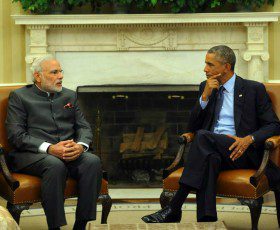This opinion piece was originally published in The Boston Globe.
By Nicholas Burns, Professor of the Practice of Diplomacy and International Politics, Harvard Kennedy School; SAI Steering Committee Member
THE UNITED STATES has a major opportunity this month to return to a close security and economic partnership with India — a priority of the last three American presidents. The new Indian Prime Minister, Narendra Modi, signaled he wants to get beyond the problem-ridden last few years between Delhi and Washington by inviting President Obama to be the “chief guest” at India’s elaborate Republic Day celebrations on Jan. 26. This simple but important symbolic gesture may kickstart the revival both countries have been looking for.
Modi is seeking expanded ties between the world’s two most powerful democracies with one, major purpose in mind. His electoral mandate is to rejuvenate India’s sluggish economy. With 1.2 billion people and a burgeoning middle class, Modi is going all out to raise India’s GDP growth rate from an anemic (for India) 4.5 percent to over 7 percent for the years ahead.
At an Aspen Strategy Group meeting in Delhi I attended this past weekend, Indian government and business leaders made a persistent pitch for greater US investment capital and trade to help India emerge from its economic doldrums. And, in the western Indian state of Gujarat on Sunday, Secretary of State John Kerry challenged both countries to increase trade fivefold in coming years. In his first year in office, Modi has launched a New Deal-type crusade to reform the top-heavy Indian economy, clear away burdensome state regulations, and free the entrepreneurial spirits of the Indian people.
Modi is also engineering a massive infrastructure renewal by financing major investments in railroads ($100 billion alone), ports, roads, energy, and education. Indian planners say they need to build a city the size of Chicago annually to accommodate a rapidly urbanizing population. But a new wave of foreign investment won’t happen unless Modi pushes real reform measures through Parliament.
India and the United States are also drawn together by a common interest in countering terrorist and cyber threats. They are also focused on a newly assertive China under Xi Jinping’s leadership. Indian leaders complain that China continues to contest their disputed land border and is executing a “string of pearls’’ naval strategy by establishing access rights to ports in Sri Lanka, Bangladesh, and Pakistan to hem in the Indian Navy in the Bay of Bengal and Arabian Sea.
This aggressive Chinese strategy has prompted India to seek closer naval and air cooperation with the United States as well as Japan, Australia, and the Philippines. Concerns about China will unite India and the United States in common cause for the decade to come. Both want to engage China economically and on issues such as climate change and proliferation. But neither is willing to see China dominate the critical sea lanes of the Indian Ocean and South China Sea through which a major share of the world’s energy and container traffic are shipped. India wants the US military to remain a major presence in the region. And many senior Indians argue that the United States should reconsider plans to remove its military from Afghanistan by the end of 2016 lest the Taliban be unleashed.
Obama will be received warmly in this vast country whose people have a genuinely upbeat view of the United States. Still, Washington has significant differences to work out with India on global trade talks, climate change, the frozen civil nuclear deal, and Vladimir Putin’s invasion of Crimea. Many here and in the United States also worry about Modi’s ties to the extremist Hindu nationalist movement the RSS (Rashtriya Swayamsevak Sangh). These are not insignificant problems in this unique but sometimes frustrating partnership. But the long-term trend lines are mostly positive, which gives Obama and Kerry an opening to refashion ties with this key Asian rising power.
Nicholas Burns will chair a SAI Special Event, titled ‘The Politickle Pickle: A Conversation on Indo-US Relations‘ with Tanvi Madan of the Brookings Institution, which will be rescheduled.

